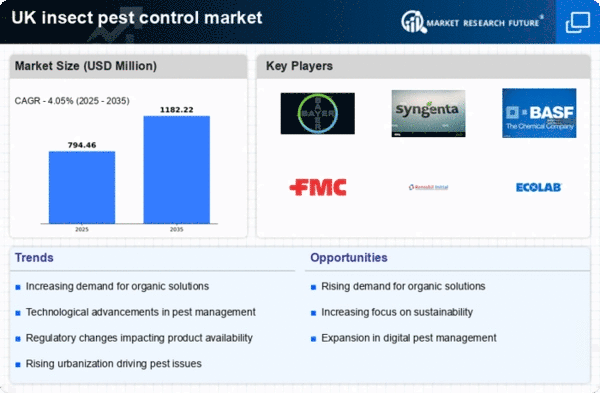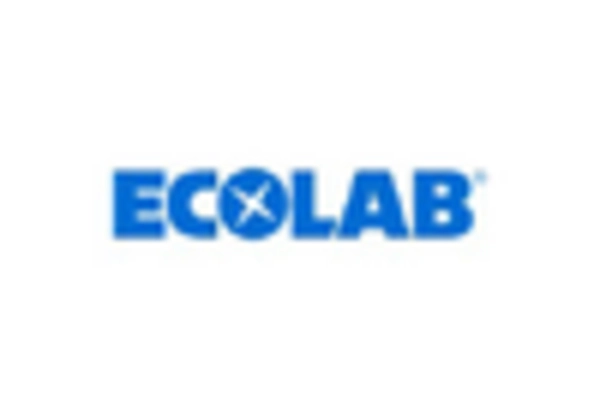Rising Urbanization
The ongoing trend of urbanization in the UK appears to be a significant driver for the insect pest-control market. As more individuals migrate to urban areas, the density of human populations increases, leading to a higher likelihood of pest infestations. Urban environments, with their unique challenges, often provide ideal breeding grounds for various pests, including rodents and insects. This situation necessitates effective pest-control solutions to maintain public health and safety. According to recent data, urban pest-control services have seen a growth rate of approximately 5% annually, reflecting the increasing demand for pest management in densely populated areas. Consequently, pest-control companies are likely to adapt their strategies to cater to urban clients, thereby expanding their market presence and service offerings.
Climate Change Impacts
Climate change is increasingly influencing the insect pest-control market in the UK. Fluctuating temperatures and changing weather patterns can alter pest behavior and distribution, potentially leading to more frequent infestations. Warmer winters may allow certain pest populations to survive longer, while increased rainfall can create favorable conditions for breeding. This evolving landscape necessitates innovative pest-control strategies to address the challenges posed by climate change. The insect pest-control market is projected to grow by approximately 4% over the next few years, driven by the need for adaptive solutions that can effectively manage pest populations in a changing climate. Companies in the industry may need to invest in research and development to create targeted pest-control products that respond to these environmental shifts.
Increased Awareness of Health Risks
There is a growing awareness among the UK population regarding the health risks associated with pest infestations, which serves as a crucial driver for the insect pest-control market. Pests such as rodents and insects can transmit diseases, leading to heightened concerns about public health. This awareness has prompted both residential and commercial sectors to seek professional pest-control services to mitigate these risks. Recent surveys indicate that approximately 60% of households are now more proactive in addressing pest issues, reflecting a shift in consumer behavior. As a result, pest-control companies are likely to experience increased demand for their services, leading to potential market growth of around 5% in the coming years. This trend underscores the importance of effective pest management in safeguarding public health.
Regulatory Compliance and Standards
The insect pest-control market in the UK is significantly influenced by regulatory compliance and standards. Stricter regulations regarding pesticide use and environmental safety are prompting pest-control companies to adapt their practices. Compliance with these regulations is essential for maintaining operational licenses and ensuring consumer trust. As a result, companies are increasingly investing in training and certification programs to meet these standards. The market is likely to see a growth rate of approximately 3% as businesses align their operations with regulatory requirements. This focus on compliance not only enhances the credibility of pest-control services but also encourages the development of safer, more sustainable pest management solutions. Consequently, adherence to regulations is becoming a key driver for growth in the insect pest-control market.
Technological Advancements in Pest Management
Technological advancements are playing a pivotal role in shaping the insect pest-control market. Innovations such as smart traps, drones for monitoring infestations, and data analytics for predictive pest management are becoming increasingly prevalent. These technologies not only enhance the efficiency of pest-control measures but also improve the accuracy of pest detection and treatment. The integration of technology into pest management practices is expected to drive market growth, with estimates suggesting a potential increase of 6% in the sector over the next few years. Companies that embrace these advancements may gain a competitive edge, as they can offer more effective and environmentally friendly solutions to their clients. This trend indicates a shift towards a more sophisticated approach to pest control, aligning with the evolving needs of consumers.
















